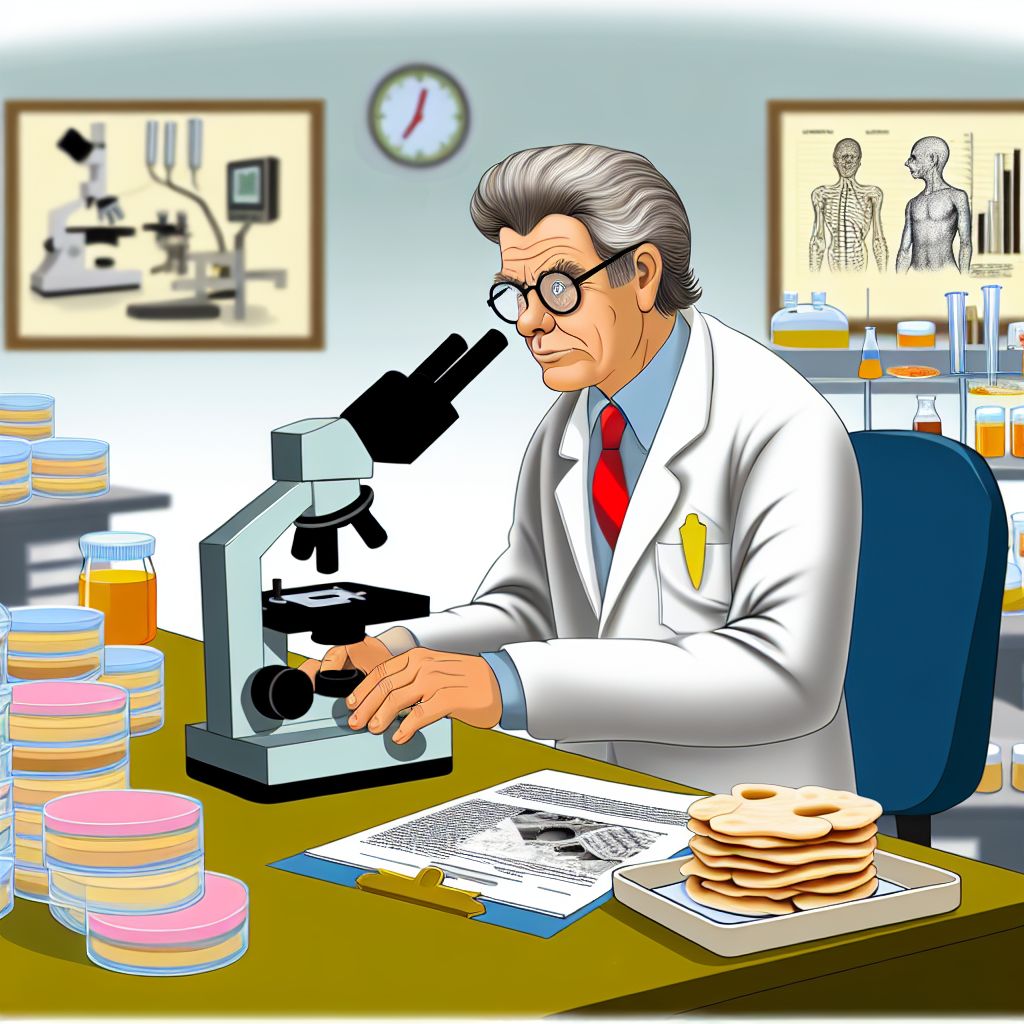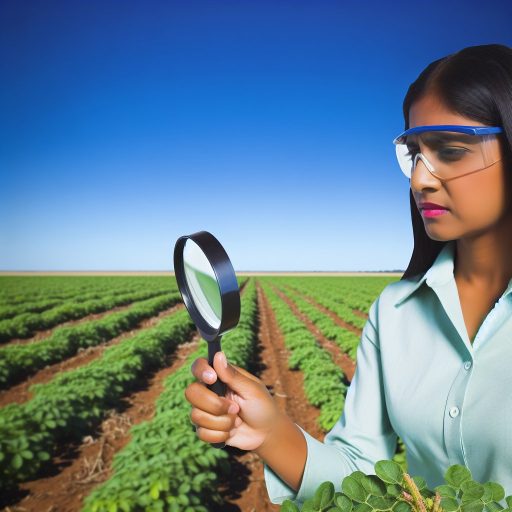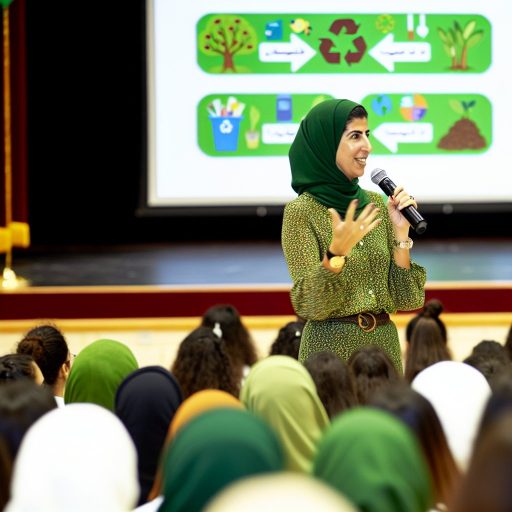Climate change refers to long-term changes in temperature, precipitation, and other atmospheric conditions.
These changes have profound effects on the environment, including rising sea levels, more frequent and severe storms, and changes in ecosystems.
Food science plays a crucial role in addressing the impacts of climate change on agriculture, food production, and nutrition.
By understanding the changes in climate patterns and their effects on food availability, scientists can develop sustainable solutions to ensure food security for future generations.
The Connection between Climate Change and Food Production
Climate change has a direct impact on food production.
It influences crop yields and food scarcity.
Changing weather patterns can affect food production.
1. Changing Weather Patterns:
Climate change is causing shifts in weather patterns.
This includes changes in temperature and precipitation.
These alterations can impact the growth and development of crops.
As a result, there may be a reduction in yields.
For example, rising temperatures can affect flowering.
They can also impact the pollination process of plants.
Irregular rainfall patterns can lead to droughts or floods.
Both of these conditions can reduce crop productivity.
2. Extreme Weather Events:
Extreme weather events like hurricanes can damage crops.
Typhoons, heatwaves, and prolonged droughts are also becoming more frequent.
These events can devastate agricultural lands.
Transform Your Career Today
Unlock a personalized career strategy that drives real results. Get tailored advice and a roadmap designed just for you.
Start NowThey can destroy crops and livestock as well.
These conditions disrupt food supply chains.
For instance, severe drought can lead to crop failures.
This situation can cause food shortages and price spikes.
Changing Weather Patterns Affecting Crop Yields
Changing weather patterns impact crop yields.
This occurs by altering the conditions necessary for plant growth.
1. Temperature Changes:
Rising temperatures can accelerate evaporation rates.
This leads to soil moisture depletion and drought stress in plants.
High temperatures can negatively affect photosynthesis.
They can also reduce the productivity of crops.
2. Precipitation Variability:
Irregular rainfall patterns result in uneven water distribution.
This can lead to waterlogging or soil dryness.
Lack of moisture can hinder seed germination and root development.
This ultimately affects the yield of crops.
3. Pest and Disease Outbreaks:
Changes in weather also influence pests and diseases.
Warmer temperatures create favorable conditions for pests.
These factors cause significant damage to agricultural productions.
Transform Your Career Today
Unlock a personalized career strategy that drives real results. Get tailored advice and a roadmap designed just for you.
Start NowImpact of Extreme Weather Events on Food Scarcity
Extreme weather events exacerbate food scarcity.
This happens by disrupting food production and distribution systems.
1. Crop Losses:
Severe weather events can destroy entire crops.
This leads to significant losses for farmers.
Such losses affect farmers’ livelihoods.
They also reduce food availability in markets.
2. Infrastructure Damage:
Extreme weather events can damage agricultural infrastructure.
This includes irrigation systems and storage facilities.
Transportation networks can also be affected.
This hinders timely food delivery from farms to markets.
As a result, food shortages occur in disaster-affected areas.
3. Displacement and Migration:
Communities may abandon homes due to extreme weather events.
People often lose agricultural lands due to destruction.
This displacement can lead to food insecurity.
People struggle to access sufficient and nutritious food.
They particularly face challenges in disaster aftermaths.
Technological advancements in food science to combat climate change
As the effects of climate change become more pronounced, the field of food science is actively seeking innovative solutions to ensure global food security.
Transform Your Career Today
Unlock a personalized career strategy that drives real results. Get tailored advice and a roadmap designed just for you.
Start NowHere are some key technological advancements that are being developed to address the challenges posed by climate change:
Innovations in crop breeding for resilience to extreme conditions
- Utilization of gene editing tools such as CRISPR-Cas9 to develop crops with increased tolerance to drought, heat, and pests.
- Integration of traditional breeding techniques with modern genomic technologies to accelerate the breeding process.
- Development of biofortified crops that are enriched with essential nutrients to combat malnutrition in vulnerable populations.
- Exploration of wild plant species for novel traits that can enhance the resilience of cultivated crops.
- Collaboration between public and private sectors to share resources and expertise in crop improvement efforts.
Sustainable farming practices to reduce greenhouse gas emissions
- Adoption of precision agriculture techniques such as drone technology and satellite imaging to optimize resource use.
- Implementation of agroforestry systems that combine trees with crops and livestock to sequester carbon and improve soil health.
- Integration of cover cropping and crop rotation strategies to enhance biodiversity and reduce the reliance on synthetic inputs.
- Utilization of biodegradable mulches and bio-based fertilizers to minimize the environmental impact of conventional farming practices.
- Promotion of organic farming methods that prioritize soil health, biodiversity conservation, and resource efficiency.
These advancements in food science are critical for building a more sustainable and resilient food system in the face of climate change.
By investing in research and technology development, we can ensure that our global food supply remains secure and accessible for future generations.
Explore Further: How to Become an Agricultural Laborer: Step-by-Step Guide
Shifts in Dietary Patterns Due to Climate Change
Adapting food choices is crucial to reduce environmental impact.
Consumers must be educated about sustainable eating habits.
Plant-based diets are a key solution to mitigate climate change effects.
Raising awareness about the benefits of plant-based foods is essential.
Reducing meat consumption can significantly lower carbon emissions.
Shifting towards a more plant-focused diet can help preserve natural resources.
The Importance of Adapting Food Choices to Reduce Environmental Impact
Food production contributes to greenhouse gas emissions and deforestation.
Choosing locally sourced and seasonal foods can lower carbon footprint.
Opting for organic products can reduce the use of harmful chemicals.
Eating less processed foods can help reduce packaging waste.
Diversifying food sources can promote biodiversity and sustainability.
Promoting Plant-Based Diets to Mitigate Climate Change Effects
Plant-based diets require fewer resources and produce fewer emissions.
Encouraging plant-based meals can reduce water usage in food production.
Increasing plant consumption can help address food security challenges.
Plant-based diets are associated with lower rates of chronic diseases.
Promoting plant-based options in restaurants and schools can drive change.
Transform Your Career Today
Unlock a personalized career strategy that drives real results. Get tailored advice and a roadmap designed just for you.
Start NowExplore Further: Promoting Agricultural Careers to Students
Food Safety Concerns Related to Climate Change
With climate change becoming a pressing issue, food safety concerns have been at the forefront of discussions.
The alterations in production conditions caused by climate change can lead to various challenges in ensuring food safety.
One of the main concerns is the potential increase in foodborne illnesses due to these changes.
The changing climate can result in fluctuations in temperature and humidity levels, creating an environment that is conducive to the growth of harmful bacteria.
This can affect the safety of food products at every stage of production, from cultivation to processing and distribution.
With rising temperatures, food storage practices may need to be adjusted to prevent contamination and spoilage.
High temperatures can accelerate the growth of pathogens in food, increasing the risk of foodborne illnesses.
Proper storage conditions are essential to maintaining the safety and quality of food products.
In addition to storage, the distribution of food products can also be impacted by climate change.
Extreme weather events, such as storms and floods, can disrupt supply chains and transportation routes, leading to delays in delivery and potential food safety risks.
It is crucial for food suppliers and retailers to adapt to these changing conditions to ensure the safety of the products reaching consumers.
Furthermore, the shift in climate patterns can also affect the availability and quality of water resources used in food production.
Changes in precipitation patterns and water scarcity can impact irrigation systems and water sources, potentially leading to contamination and compromising the safety of food products.
As we continue to address the challenges posed by climate change, it is essential for food scientists and producers to prioritize food safety measures.
This includes implementing stringent quality control practices, monitoring production processes closely, and ensuring proper storage and distribution protocols are followed.
By staying vigilant and proactive, we can mitigate the risks associated with climate change and safeguard the integrity of our food supply.
The impact of climate change on food science is undeniable, and food safety concerns are a critical aspect that must be addressed.
By understanding the potential risks and challenges posed by changing environmental conditions, we can work towards developing sustainable solutions to ensure the safety and security of our food supply for future generations.
Discover More: Veterinary Technician Work-Life Balance Tips
Transform Your Career Today
Unlock a personalized career strategy that drives real results. Get tailored advice and a roadmap designed just for you.
Start NowFood Scientists and Climate Change
Food scientists play a crucial role in addressing the impact of climate change on food systems.
Responsibility of Food Scientists:
- Developing sustainable solutions to ensure food security in the face of environmental challenges.
- Adapting food production methods to minimize carbon footprint and reduce greenhouse gas emissions.
- Promoting agricultural practices that are resilient to extreme weather events and changing climatic conditions.
- Collaborating with farmers, policymakers, and other stakeholders to implement climate-smart strategies in food production.
Research Initiatives for Climate-Resilient Food Systems:
- Studying the effects of climate change on crop yields, nutritional content, and food quality.
- Developing drought-tolerant crop varieties that can thrive in water-stressed environments.
- Exploring innovative technologies, such as precision agriculture and vertical farming, to increase food production efficiency.
- Investigating the impact of climate change on food safety, including the spread of foodborne illnesses due to warmer temperatures.
Food scientists play a vital role in mitigating the effects of climate change on food systems through research, innovation, and collaboration with various stakeholders.
By developing sustainable solutions and promoting climate-resilient food systems, they can help ensure food security for future generations.
Find Out More: Financial Planning Tips for Farmers

Policy implications for addressing climate change in food science
Analyze government regulations aimed at promoting sustainable agriculture
Government regulations play a crucial role in shaping the practices and technologies used in agriculture.
These regulations can incentivize or mandate the adoption of sustainable practices that reduce greenhouse gas emissions, conserve water, and protect biodiversity.
One example of government regulation is the implementation of carbon pricing mechanisms, such as carbon taxes or cap-and-trade systems.
These policies create financial incentives for farmers to reduce their carbon footprint by adopting practices that sequester carbon in the soil or reduce methane emissions from livestock.
Another important tool for promoting sustainable agriculture is the regulation of pesticide and fertilizer use.
By setting limits on the amount and type of chemicals that can be used in farming, governments can protect soil health, water quality, and biodiversity while also reducing greenhouse gas emissions associated with chemical production and application.
Additionally, government regulations can promote the adoption of renewable energy sources in agriculture, such as solar and wind power.
By incentivizing or requiring farmers to generate their own clean energy, governments can reduce the carbon footprint of food production and increase resilience to climate change impacts.
Discuss international agreements to combat climate change effects on food production
International agreements are crucial for addressing the global nature of climate change and its impacts on food production.
One of the most significant agreements in this regard is the Paris Agreement, which aims to limit global warming to well below 2 degrees Celsius above pre-industrial levels.
Under the Paris Agreement, countries have submitted Nationally Determined Contributions (NDCs) outlining their targets for reducing greenhouse gas emissions.
These targets are critical for limiting the impacts of climate change on food production, as higher temperatures, changing precipitation patterns, and extreme weather events can all disrupt agricultural systems.
In addition to the Paris Agreement, international agreements such as the United Nations Framework Convention on Climate Change (UNFCCC) and the Intergovernmental Panel on Climate Change (IPCC) provide important frameworks for scientific research and policy development related to climate change and food production.
Furthermore, international agreements can promote cooperation and knowledge sharing among countries, helping to spread best practices for adapting to and mitigating the impacts of climate change on food systems.
By working together, countries can build more resilient and sustainable food production systems that can withstand the challenges of a changing climate.
Consumer Awareness and Behavior in Response to Climate Change
Role of Consumer Demand in Driving Sustainable Food Practices
Consumer demand plays a pivotal role in shaping the practices of food producers and suppliers.
Transform Your Career Today
Unlock a personalized career strategy that drives real results. Get tailored advice and a roadmap designed just for you.
Start NowAs consumers become more aware of the impact of climate change on food production, there is a growing demand for sustainable and environmentally friendly food options.
List of ways consumer demand drives sustainable food practices:
- Preference for organic and locally sourced foods.
- Support for companies with transparent and ethical supply chains.
- Demand for products with minimal packaging and waste.
- Interest in plant-based and alternative protein options.
- Advocacy for fair labor practices and farmer welfare.
Importance of Education and Communication in Promoting Environmentally Friendly Food Choices
Education and communication are essential tools in empowering consumers to make environmentally conscious food choices.
By providing information and raising awareness about the impact of climate change on food production, consumers can make informed decisions that contribute to sustainability efforts.
Ways in which education and communication promote environmentally friendly food choices:
- Creating campaigns to raise awareness about sustainable farming practices.
- Offering resources on how individuals can reduce their carbon footprint through diet choices.
- Collaborating with schools and communities to educate the next generation of consumers.
- Engaging with consumers through social media and marketing campaigns to advocate for sustainability.
- Establishing partnerships with environmental organizations to support initiatives for sustainable food production.
Impact of Climate Change on Food Science
The impact of climate change on food science is evident in various aspects.
Changing climate patterns are affecting crop production, food quality, and food safety.
It is crucial for food scientists to collaborate with policymakers and consumers.
This collaboration will address these challenges effectively.
By working together, we can develop sustainable solutions.
These solutions will ensure food security for future generations.
Adaptation strategies and innovation in food technology are essential.
Promoting sustainable practices can mitigate the effects of climate change.
This collaboration is key to safeguarding our food supply.
We must ensure a healthy and sustainable future for all.
Additional Resources
Climate Impacts on Human Health | Climate Change Impacts | US EPA
Food Waste and its Links to Greenhouse Gases and Climate Change




